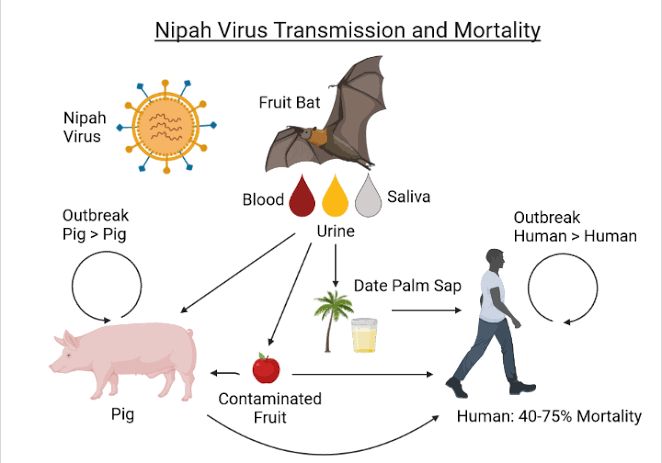In response to growing concerns regarding the potential outbreak of the Nipah virus in the region, the Punjab government has declared a state of high alert, covering all areas within the province, including the capital city of Lahore. This alert represents a significant move in the battle against the looming threat of the Nipah virus.
The Punjab Health Department has taken swift action by issuing comprehensive guidelines to all Chief Executive Officers (CEOs) of Health, urging immediate reinforcement of preventive measures against Nipah infection across all districts within the province.
A particularly alarming aspect highlighted in the issued advisory is the high mortality rate associated with the Nipah virus, currently estimated at a staggering 74%. This underscores the urgency and seriousness of the situation.
Furthermore, the circular emphasizes the rapid spread of the Nipah virus in neighboring countries, sparking fears of potential transmission to Pakistan. To counter this looming threat, the CEOs of Health have been directed to promptly upload data on all suspected Nipah-affected patients to a centralized dashboard.
Additionally, private and public sector hospitals are urged to strictly adhere to the provided guidelines.
A crucial component of the containment strategy is the careful monitoring of all potentially affected patients, who must be isolated based on suspicion. To expedite the diagnostic process, samples must be collected and expeditiously sent to the laboratory for PCR testing.
The Nipah virus has exhibited a propensity for rapid transmission, both from animals to humans and from person to person. Adding to the challenge is the lack of a specific vaccine for the virus, making timely diagnosis and treatment the only effective strategies against it.
Past Outbreaks and Current Concerns
The Nipah virus was initially identified in 1999 during an outbreak among pig farmers in Malaysia. No new outbreaks have been reported in Malaysia since 1999. Subsequently, it was recognized in Bangladesh in 2001, with nearly annual outbreaks occurring in that country since. The disease has also been sporadically identified in eastern India.
Evidence of the virus has been found in various bat species in numerous countries, including Cambodia, Ghana, Indonesia, Madagascar, the Philippines, and Thailand. Transmission to humans has been attributed to direct contact with infected pigs, consumption of contaminated fruits or fruit products, and human-to-human transmission in healthcare settings.
Symptoms and Diagnosis
Nipah virus infections in humans can manifest as asymptomatic or range from mild to severe respiratory infection and fatal encephalitis. Symptoms include fever, headaches, myalgia (muscle pain), vomiting, sore throat, dizziness, drowsiness, altered consciousness, and neurological signs indicating acute encephalitis. The incubation period ranges from 4 to 14 days but can extend to 45 days.
While most survivors of acute encephalitis recover fully, approximately 20% suffer residual neurological consequences, such as seizure disorders and personality changes. The case fatality rate varies from 40% to 75% depending on local capabilities for epidemiological surveillance and clinical management.
Prevention and Control
Preventing Nipah virus infection hinges on minimizing bat-to-human, animal-to-human, and human-to-human transmission. Strategies include reducing bat access to date palm sap and other fresh food products, using protective clothing when handling sick animals, and avoiding close unprotected contact with infected individuals.
Due to the absence of a vaccine, public health education is vital in raising awareness of risk factors and preventive measures. Efforts must also focus on early detection, infection control, and outbreak response activities.
The declaration of a high alert in Punjab underscores the importance of proactive measures in tackling the potential Nipah virus threat and safeguarding public health. Continued vigilance, effective communication, and collaborative efforts between healthcare authorities and the community will play a crucial role in minimizing the risk of infection.






